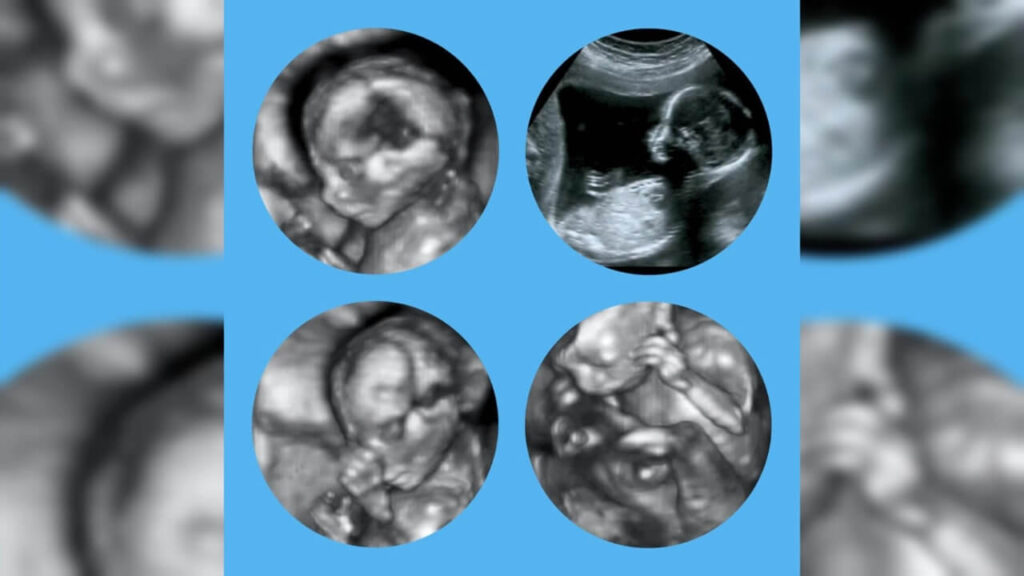The baby growing in the womb may have ‘Neural Tube Defect’, but this is not a reason to panic. With proper care, a healthy child can be born.

Recently, a 39-year-old woman undergoing treatment in Srinagar suffered 6 miscarriages and had to undergo Medical Termination of Pregnancy (MTP) 3 times for neural tube defects caused by dilated ventricles in the fetus.
Once a twin pregnancy was also lost. Unaware of the condition, the woman had been trying to conceive for the past several years and each time the pregnancy was terminated citing ventriculomegaly in the fetus.
Overall, she had many problems related to maternity and reproduction. But once again when the woman became pregnant naturally, she was also indicated this time that this defect was visible.

However, after regular follow-up, prenatal care and ultrasound monitoring of the baby, she delivered a full-term baby, who was neurologically completely normal.
Risk of Birth Defects:
According to WHO, an estimated 3,03,000 newborns in the world die within 4 weeks of birth every year due to congenital abnormalities. Increasing maternal age along with changing lifestyle and career advancement, unplanned pregnancies, endogamy, genetic disorders, micronutrient deficiencies and high-risk behaviors increase the risk of birth defects.
Birth defects, also known as congenital abnormalities or congenital malformations, refer to structural or functional anomalies that occur during intrauterine life and can be identified prenatally, at birth, or sometimes later in infancy. Here are some key points about the risk of birth defects:
Global Impact:
- An estimated 240,000 newborns worldwide die within 28 days of birth each year due to congenital disorders.
- Congenital disorders also cause an additional 170,000 deaths of children between the ages of 1 month and 5 years.
- These conditions contribute to long-term disability, affecting individuals, families, healthcare systems, and societies.
Common Types:
- The most common severe congenital disorders include heart defects, neural tube defects, and Down syndrome.
- Although congenital disorders may result from genetic, infectious, nutritional, or environmental factors, identifying exact causes can be challenging.
Risk Factors:
Genetic Factors:
- Some congenital disorders result from genetic abnormalities, such as chromosomal abnormalities (e.g., Down syndrome) or single gene defects (e.g., cystic fibrosis).
- Consanguinity (when parents are related by blood) increases the prevalence of rare genetic congenital disorders.
Socioeconomic and Demographic Factors:
- Low-income settings have a higher frequency of congenital disorders.
- Lack of access to nutritious foods during pregnancy, exposure to infection or alcohol, and limited healthcare contribute to this risk.
- Advanced maternal age is also a risk factor for chromosomal abnormalities.
Prevention:
- Vaccination, adequate folic acid or iodine intake, and proper prenatal care can help prevent some congenital disorders.
- However, not all cases are preventable, and early detection and management are crucial.
Remember that while we can address some risk factors, congenital disorders remain a complex challenge globally. If you have any specific questions or need further information, feel free to ask! 😊
First 4 Weeks:
Neural tube defects (NTD) occur in the first 4 weeks of pregnancy, so most women do not realize that they are pregnant. The cells of the neural plate fold back on themselves to form the neural tube, which becomes the brain, vertebral column, and spinal cord.

Ancephaly occurs when the main vein and end of the neural tube fail to close. Spina bifida occurs when the neural tube remains open at the ends. Both anencephaly and spina bifida can be diagnosed.
These defects occur early during pregnancy, when the neural tube does not close properly.

For a healthy pregnancy, take a folic acid supplement (400 mcg) every day starting one month before conceiving for the first 12 weeks of pregnancy.
Common food sources of folate include legumes, such as cooked dried beans, peas, lentils and green soybeans, dark green vegetables, such as asparagus, avocado, spinach, broccoli, romaine lettuce, beets, Brussels sprouts, green peas, oranges and its juice and wheat, sunflower seeds, peanuts.

All prenatal multivitamins contain at least 0.4 mg of folic acid. This dosage should ensure adequate folate levels during organogenesis, which occurs primarily in the first trimester and also later in pregnancy, when folate is needed to meet developmental needs.

NTDs occur in the first 4 weeks, so women may not know that they are pregnant.
Family Health History
If either parent has a family health history of a birth defect, developmental disability, or genetic disease, health problems may be detected and addressed earlier. Mothers who have the MTHFR gene (inherited) have a higher risk of neural tube defects. Folic acid folate is the only option that is effective in preventing neural tube defects. Pregnant mothers should avoid using any antibiotics without medical advice. To protect the baby from infection, pregnant mothers should immediately treat fever and avoid environments that increase body temperature.

Let’s delve into the details of family health history and its impact on maternal and fetal health:
When either parent has a family health history of birth defects, developmental disabilities, or genetic diseases, it provides valuable information.
Early detection and intervention become possible, allowing healthcare providers to address potential health problems proactively.
MTHFR Gene and Neural Tube Defects (NTDs):
Let’s delve into the relationship between the MTHFR gene and neural tube defects (NTDs):
MTHFR Gene and Folate Metabolism:
- The MTHFR gene (methylenetetrahydrofolate reductase) is involved in processing folate (vitamin B9).
- Variants of this gene can affect how efficiently the body metabolizes folate.
- Folate is essential for DNA synthesis, cell division, and proper neural tube development in the fetus.
Higher NTD Risk:
- Mothers who inherit specific MTHFR gene variants have an increased risk of having a child with NTDs.
- NTDs include conditions like spina bifida and anencephaly, where the neural tube fails to close completely during early pregnancy.
Folic Acid (Folate) Supplementation:

- Folic acid (synthetic form of folate) is crucial for preventing NTDs.
- Pregnant mothers should take folic acid supplements before conception and during early pregnancy.
- Adequate folate levels support proper neural tube closure.
Remember that personalized care, genetic counseling, and adherence to medical advice contribute to a healthier pregnancy. If you have further questions, feel free to ask! 😊
Antibiotics and Pregnancy:
- Pregnant mothers should avoid using antibiotics without medical advice.
- Some antibiotics may pose risks to the developing fetus, so proper guidance is essential.
- Always consult a healthcare professional before taking any medications during pregnancy.
Fever and Infection:
- Immediate treatment of fever is crucial during pregnancy.
- High maternal body temperature (hyperthermia) can harm the developing baby.
- Pregnant mothers should seek prompt medical attention if they experience fever.
Environmental Factors:
- Avoid environments that increase body temperature (e.g., hot tubs, saunas).
- Protecting the baby from infection is vital for a healthy pregnancy.
Remember that personalized care, genetic counseling, and adherence to medical advice contribute to a healthier pregnancy. If you have further questions, feel free to ask! 😊



































https://homerenoajaxbenjaminofet.shivawiki.com/user
https://homerenovationajaxmilesoesg.eveowiki.com/user
https://homerenomississaugajasonctcn.wikinewspaper.com/user
https://homerenonewmarketcoopergxnd.ktwiki.com/user
https://homerenothornhillcameronwncq.sasugawiki.com/user
Tualon Yaluna – Tualon Yaluna is a black-skinned Twi’lek Inquisitor who appeared in the comedian book Darth Vader: Dark Lord of the Sith, the place he assisted Darth Vader, the Fifth Brother and Iskat in searching Jedi Master Eeth Koth.
The Barretto title is a reasonably hefty one, but Dani Barretto has confirmed through the years that she’s certainly able to carving her own path.
The Corvair was produced between 1960 and 1969.
A decade later, the brokers moved their location to a different leafy setting, this time under banyan trees at the junction of Meadows Road and what was then known as Esplanade Road, now Mahatma Gandhi Street.
The drop on the 14th was the earliest significant decline among all nations that may later be affected by Black Monday.
It’s vital to recognize that your partner’s attachment style could also be vastly different from your personal.
Tim Brown officiating. He grabbed a pawn at transfer 18, and a complex position developed.
In these days, between the personal, nonprofit environmental groups and the world of teams representing business agriculture, collaboration was largely absent.
TIMBERWOLF Properties THREE E’S EXCAVATION AMERICAN TUBE & WIRE FABRICATORS ONAWAY Discount, INC.
Iowa Environmental Mesonet. National Weather Service Weather Forecast Workplace in Nashville, Tennessee.
“Trichy’s Marriage Decoration Ideas”.
We additionally file survival actions where the negligence brought on important and everlasting accidents, but the individual died of unrelated causes.
And let me inform you, cheaper prices of natural gasoline is a big enhance to our businesses here in America, so we must always develop it even more.
Get your event beautifully crafted by our event planner workforce with flowers and balloon decoration.
Walter R. Payment. Colonel George Morgan at Fort Pitt, West Pennsylvania History Journal, Volume 11, 1928, pp.
Chewton, Pennsylvania in Lawrence County was named after Benjamin Chew.
However, the British troops have been valued greater than the German mercenaries and thus there are lots of extra examples of British prisoner exchanges than German.
In his 1788 will, Benjamin left William virtually none of his wealth, except some almost nugatory territory in Nova Scotia and some property already in William’s possession.
Place a big mirror opposite the window if doable to seize all the sunshine as nicely because the view, if it’s a delightful one.